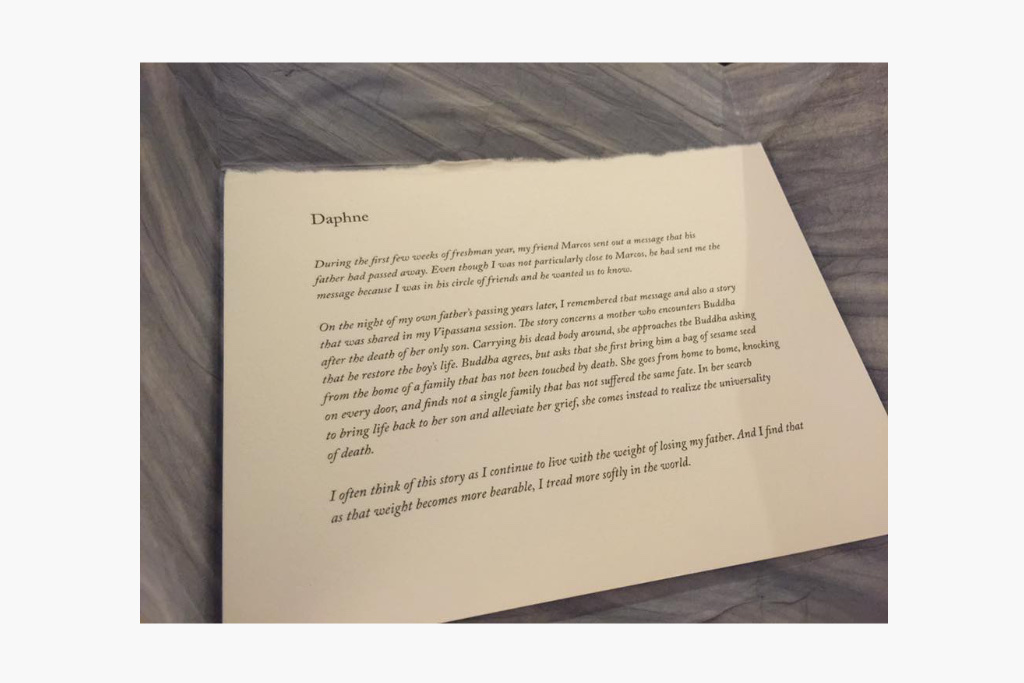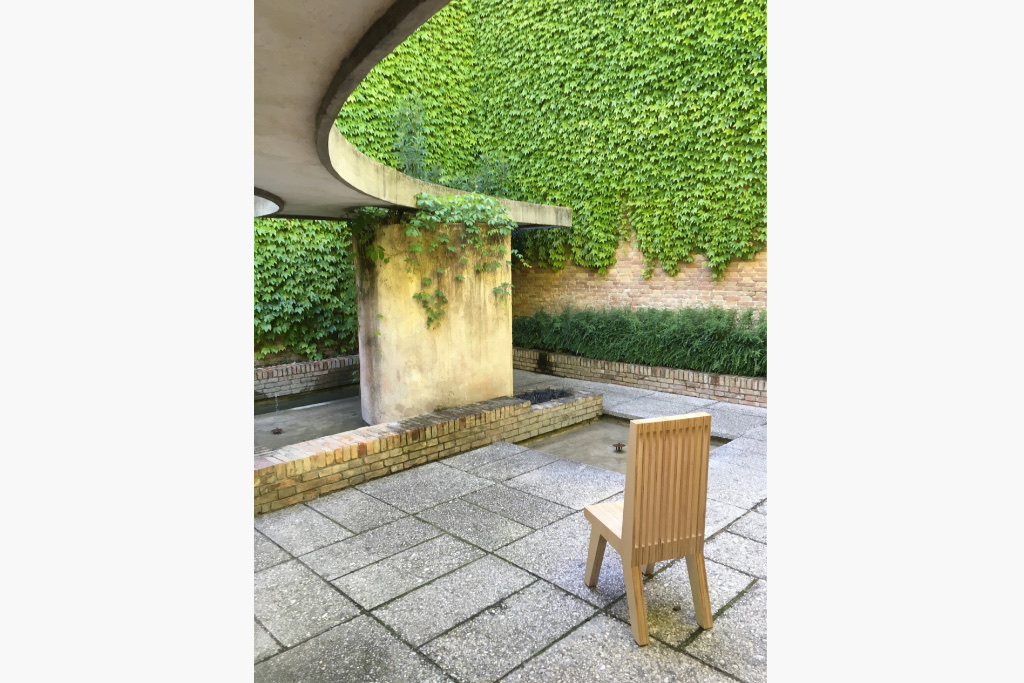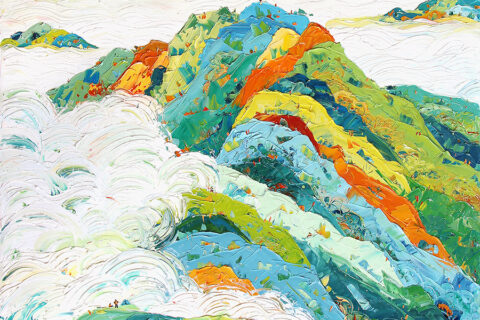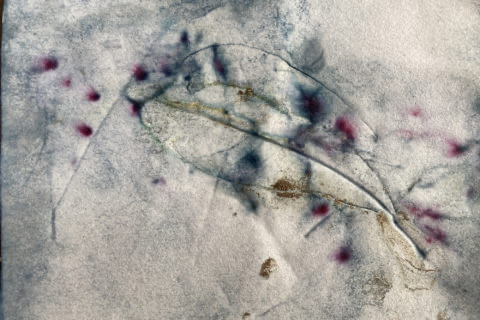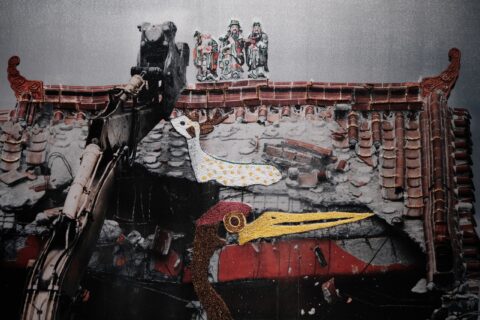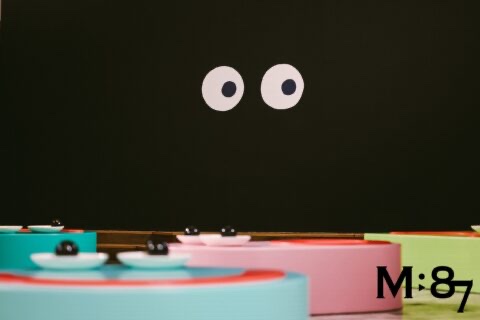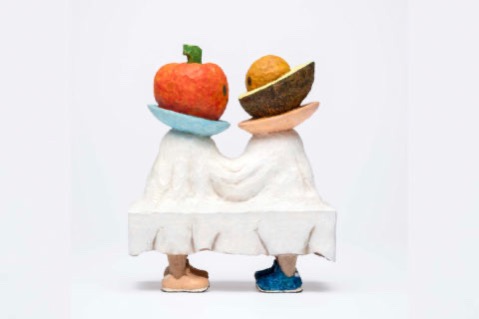
藝術家李明維將創作化成一場又一場與陌生的相遇及互動,他相信在不期而遇的國度裡有著真、善、美。
今屆威尼斯雙年展中,李明維讓參觀人士發掘《不期之美》。史卡帕花園的主人會帶領觀眾遊覽花園,並坐在一張椅子上靜心傾聽花園內的蟲鳴,之後花園主人會讓觀眾獨處欣賞園中美景,專注靜謐時刻。主人折返時會贈予觀眾一份禮物:一個信封。李明維在信封上註明「你可取走這份禮物,但是希望你打開這份禮物時,是下一個你遇見美的時刻。」
朋友在威尼斯雙年展中,拿到了這份禮物。之後某一天在面書的提醒下知道跟好朋友認識周年,巧合的是二人剛結伴參觀威尼斯雙年展。朋友於是打開信封,裡頭載著一個陌生人的故事: Daphne 在大學時,同學公佈父親離世的消息,當時不以為然。後來自己父親離世,才體會到面對親人離世的傷痛。之後Daphne 因為一個關於婦人求僧人為已死去的兒子重生的故事,明白生老病死是每人必經的過程,那種沉痛人皆經歷。於是失去父親那種不能承受的重,變成溫柔的力量。假如每個相遇都不是偶然,人生就似是由不同點線而成。一次的相遇引領我們方向,去尋找下一個相遇。
李維明的作品就是陌生與陌生之間的引領。他收集故事,讓聽故事的人看見美好的預示;也要出席展覽的觀眾,採摘美術館內的花,然後在離開美術館後,到達下一個目的地前,把花送給途中遇上的陌生人;他跟陌生人進餐,分享故事。參觀者及當中的陌生元素是李明維作品中的主角:「一個陌生人為另一個陌生人做一件事,這對我來說是重要的,打破了『只有藝術家是難得可貴』的規則。珍貴的不是李明維,而是陌生人的相遇、信任、溝通,不只是期待,也是一種接受與諒解。」
陌生的相遇在李明維藝術世界中只是一刻,沒有後續故事。無論那是打開信封,或者是收到陌生人贈花,那都是一瞬。他以一刻喚醒人們去好好打理人生的花園,因為花園荒廢得太久,便看不見當中的溫柔美麗。
Lee Mingwei, an artist, has turned his creations into a series of encounters and interactions. He believes that there is truth, compassion and beauty in the realm of chance encounters.
At Venice Biennale this year, Lee invites viewers to explore “When Beauty Visits”. The host of the Carlo Scarpa garden will lead visitors on a tour during which they will sit on a chair to listen, with a quiet mind, to insects chirping in the garden. Then, the host will let them spend some time on their own to admire the beautiful views there, and to focus their mind on moments of tranquility. The host will later return with a present for each visitor — an envelope. Lee has written the followings words on the envelope: “You can take away this present, but I hope that the moment you open it will be the next moment that you meet beauty.”
A friend of mine received this present at Venice Biennale. Then one day, thanks to a Facebook reminder, he knew that it was the anniversary of his acquaintance with a good friend, together with whom, as it happened, he went to Venice Biennale. This prompted him to open the envelope, inside which is a story of a stranger: When Daphne was studying at university, a classmate announced the death of his father. Daphne did not make much of it at that time. It was only later when her own father passed away that she finally experienced the pain of losing a close relative. At a later time, thanks to a story about a woman imploring a monk to revive her son from death, Daphne understood that birth, old age, illness and death are inevitable stages in life, with which came the deep grief that everyone must go through. Therefore, the unbearable burden of losing her father turned into a powder of tenderness. If every encounter is not a coincidence, then our life is made up of various dots and lines. One encounter gives us the direction to look for our next encounter.
Lee’s works act as a guide between unfamiliarities. He has collected stories so that those who listen to them can foresee beauty ahead; he has also asked visitors to his exhibition to pick some flowers in the museum and offer them to a stranger they meet on their way from the museum to the next destination; he has had meals with strangers to swap stories. Visitors and the associated element of unfamiliarity play a major role in his works: “To me, that a stranger does something for another stranger is very important because that violates the rule that says ‘only artists are invaluable’. What is invaluable is not Lee Mingwei, but rather the encounters, the trust and the communication between strangers; it is not just anticipation but also a kind of acceptance and reconciliation.”
An encounter with the unfamiliar lasts for only a moment in Lee’s world of art, without any follow-up stories. Whether it is opening an envelope, or receiving flowers from a stranger, it lasts for only a moment. He uses one moment to inspire others to take good care of the garden of their own life because if the garden is left unattended for too long, they can no longer see the tenderness and beauty inside.
“When Beauty Visits, 2017” Image courtesy of Sam Phillips
